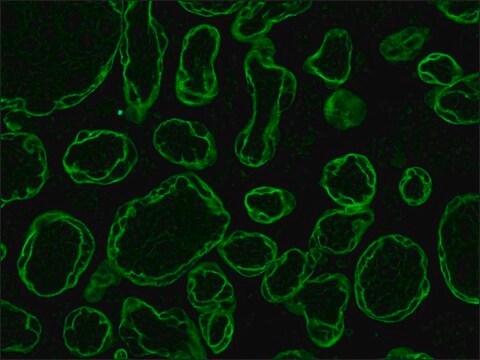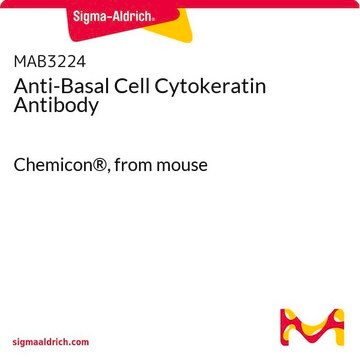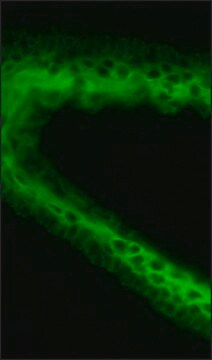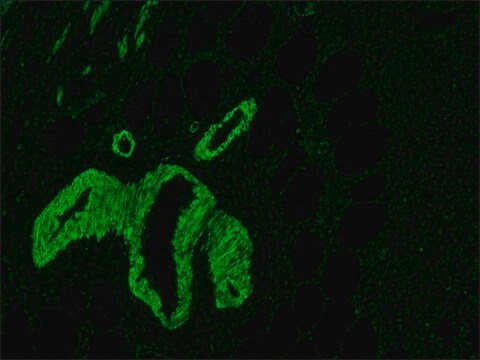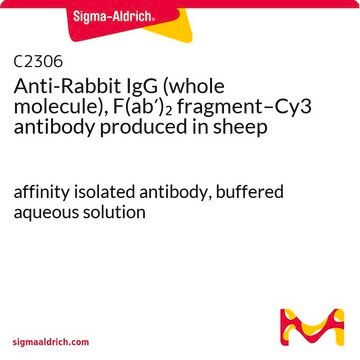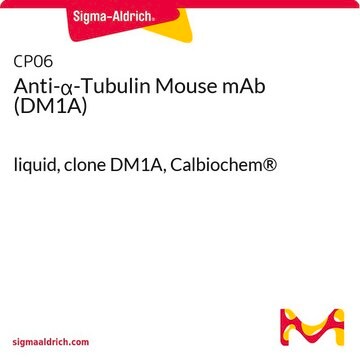추천 제품
생물학적 소스
mouse
결합
FITC conjugate
항체 형태
purified from hybridoma cell culture
항체 생산 유형
primary antibodies
클론
PCK-26, monoclonal
형태
buffered aqueous solution
기술
direct immunofluorescence: 1:25 using formalin-fixed, paraffin-embedded sections of human or animal tissues
immunohistochemistry (frozen sections): suitable
배송 상태
dry ice
저장 온도
−20°C
타겟 번역 후 변형
unmodified
일반 설명
Cytokeratins are proteins of keratin-containing intermediate filaments that provide mechanical support and other additional functions in epithelial cells. It is found in the intracytoplasmic cytoskeleton of epithelial tissue. Epithelial tissue expresses cytokeratin subunits in a specific and stable pattern. Cytokeratins along with vimentin are involved in cell proliferation, migration and differentiation of preodontoblasts and preameloblasts. The intermediate-sized filaments are abundant in human endothelial cells and are mostly of vimentin type.
FITC Monoclonal Anti-Pan Cytokeratin is a purified mouse monoclonal antibody conjugated with fluorescein isothiocyanate (FITC) isomer I. Monoclonal anti-pan cytokeratin (mouse IgG1 isotype) is derived from the PCK-26 hybridoma produced by the fusion of mouse myeloma cells and splenocytes of immunized BALB/c mice. Cytokeratins, a group comprised of at least 29 different proteins are characteristic of epithelial and trichocytic cells. Cytokeratin 5, 6 and 8 are members of the type II, neutral-to-basic subfamily. Cytokeratin peptide 5 is the primary type II keratin in stratified epithelia while cytokeratin type 8 is a major type II keratin in simple epithelia. Cytokeratin 6 is a "hyperproliferation" cytokeratin expressed in tissues with natural or pathological high turnover.
특이성
The antibody recognizes an epitope located on the Type II cytokeratins 1, 5, 6, and 8. PCK-26 is a broad spectrum antibody which reacts specifically with a variety of normal, reactive, and neoplastic epithelial tissues. The antibody reacts with simple, cornifying, and non-cornifying squamous epithelia and pseudostratified epithelia.
면역원
cytokeratin from human epidermis.
애플리케이션
Monoclonal Anti-Cytokeratin, pan-FITC antibody produced in mouse has been used in:
- immunohistochemistry
- staining chicken intestinal cells
- immunofluorescence staining
Monoclonal Anti-Cytokeratin, pan-FITC antibody produced in mouse is suitable for direct immunofluorescence at a dilution of 1:25 using formalin-fixed, paraffin-embedded sections of human or animal tissues and immunohistochemistry (frozen sections).
물리적 형태
Solution in 0.01 M phosphate buffered saline, pH 7.4, containing 1% BSA and 15 mM sodium azide.
면책조항
Unless otherwise stated in our catalog or other company documentation accompanying the product(s), our products are intended for research use only and are not to be used for any other purpose, which includes but is not limited to, unauthorized commercial uses, in vitro diagnostic uses, ex vivo or in vivo therapeutic uses or any type of consumption or application to humans or animals.
적합한 제품을 찾을 수 없으신가요?
당사의 제품 선택기 도구.을(를) 시도해 보세요.
Storage Class Code
10 - Combustible liquids
WGK
nwg
Flash Point (°F)
Not applicable
Flash Point (°C)
Not applicable
개인 보호 장비
Eyeshields, Gloves, multi-purpose combination respirator cartridge (US)
시험 성적서(COA)
제품의 로트/배치 번호를 입력하여 시험 성적서(COA)을 검색하십시오. 로트 및 배치 번호는 제품 라벨에 있는 ‘로트’ 또는 ‘배치’라는 용어 뒤에서 찾을 수 있습니다.
Miranda E Sowder et al.
Scientific reports, 8(1), 14299-14299 (2018-09-27)
Breast cancer cells frequently home to the bone, but the mechanisms controlling tumor colonization of the bone marrow remain unclear. We report significant enrichment of bone-disseminated estrogen receptor positive human MCF7 cells by 17 β-estradiol (E2) following intracardiac inoculation. Using flow
Interleukin 22 prevents lipopolysaccharide-induced preterm labor in mice
Dambaeva S, et al.
Biology of Reproduction, 98(3), 299-308 (2018)
Takashi Maeda et al.
Cancer research, 64(2), 612-621 (2004-01-28)
Infiltrating carcinomas characteristically elicit a reactive stromal response, and accumulating evidence indicates that tumor stroma fibroblasts reciprocally promote tumor development and growth. The cell surface heparan sulfate proteoglycan, syndecan-1 (Sdc1), is thought to function as a coreceptor for growth factor
Serial culture of murine primary airway epithelial cells and ex vivo replication of human rhinoviruses
Brockman-SRA, et al.
Journal of Immunological Methods, 339(2), 264-269 (2008)
Milou M L Dingemans et al.
Environmental health perspectives, 115(6), 865-870 (2007-06-26)
Increasing environmental levels of brominated flame retardants raise concern about possible adverse effects, particularly through early developmental exposure. The objective of this research was to investigate neurodevelopmental mechanisms underlying previously observed behavioral impairments observed after neonatal exposure to polybrominated diphenyl
자사의 과학자팀은 생명 과학, 재료 과학, 화학 합성, 크로마토그래피, 분석 및 기타 많은 영역을 포함한 모든 과학 분야에 경험이 있습니다..
고객지원팀으로 연락바랍니다.


